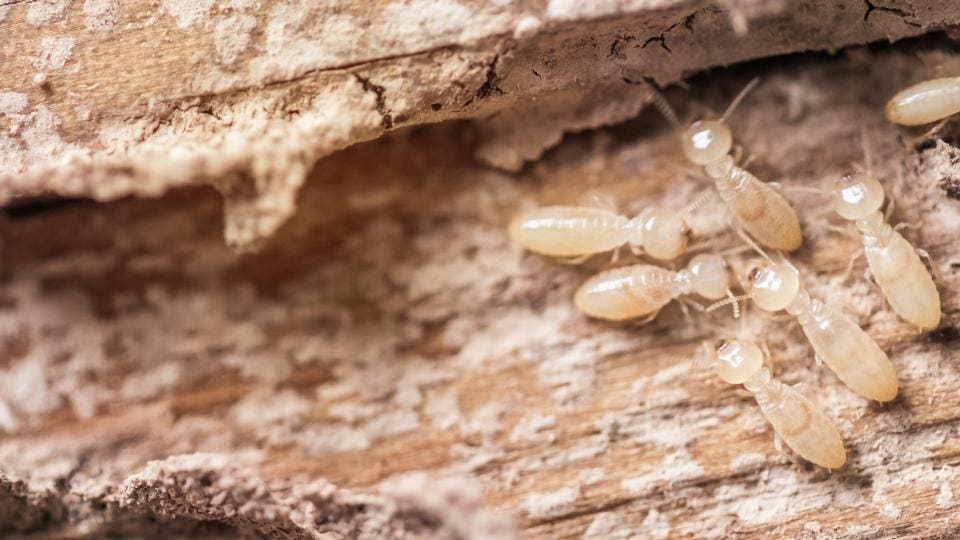
How Do You Get Rid of Termites in Your Walls
To get rid of termites in your walls, you can spray termiticide into cracks and inside the walls, following the instructions on the product. However, it is recommended to call a professional termite exterminator as removing termites is best left to experts.
Overview Of Termite Infestation In Walls
Looking for ways to get rid of termites in your walls? Termiticide is a safe and effective chemical that can be sprayed into cracks or inside walls to eliminate termites. However, it’s best to call a professional termite exterminator for optimal results.
Additionally, methods such as drilling and injecting pesticides, using heat, or applying termite-killing products can help eliminate these pests.
of termite infestation in your walls is crucial to prevent costly damages and preserve the structural integrity of your home. Ignoring these signs can lead to severe consequences, such as weakened support beams and extensive wood damage. In this section, we will discuss the signs of termite infestation in walls and the risks and damages caused by these pesky invaders.Signs Of Termite Infestation In Walls
When it comes to identifying termite infestation in your walls, there are several tell-tale signs to look out for. By being aware of these signs, you can take prompt action and minimize the damages caused by these wood-eating insects.- Bubbling or peeling paint
- Baseboards that crumble under slight pressure
- Jammed doors or windows
- Hollow-sounding or papery drywall
- Tiny holes or tunnels in the walls
Risks And Damages Caused By Termites In Walls
Termites pose significant risks and can cause extensive damages to the walls of your home. These damages can compromise the structural integrity and lead to costly repairs if left unaddressed.- Weakened support beams: Termites can eat away at the wooden support beams within your walls, resulting in weakened structural support.
- Damage to electrical wiring: As termites make their way through the walls, they can come into contact with electrical wiring, posing a fire hazard and potential power failure.
- Compromised insulation: Termites can also damage insulation materials, reducing the energy efficiency of your home and leading to higher utility bills.
- Costly repairs: If termite infestation is left untreated, it can lead to extensive damages in the walls and require costly repairs to restore the structural integrity.
Professional Termite Extermination Services
Looking to get rid of termites in your walls? Professional termite extermination services can effectively eliminate the infestation using termiticides and other targeted methods approved for indoor use. Avoid the hassle and let the experts handle the job for you.
Importance Of Hiring Professional Termite Exterminators
Termites are not only a nuisance but also pose a serious threat to the structure of your home. If you notice signs of termite infestation in your walls, it is crucial to act swiftly and hire professional termite exterminators. Here are some reasons why professional termite extermination services are essential: 1. Expertise and Experience: Professional termite exterminators have the necessary expertise and experience to identify the extent of the termite infestation accurately. They are trained to locate termite colonies and understand their behavior, enabling them to devise the most effective and targeted treatment plan. 2. Specific Termite Knowledge: Different termite species require specific treatment methods. Professional termite exterminators have in-depth knowledge about various termite species and their habits. They can identify the species affecting your walls and customize the treatment accordingly, ensuring the highest level of effectiveness. 3. Specialized Equipment and Techniques: Professional termite exterminators have access to specialized equipment and techniques that are not readily available to homeowners. They use advanced tools such as moisture meters and thermal imaging cameras to detect hidden termite colonies and identify the areas of infestation within your walls accurately. 4. Safety Measures: Termite control involves the use of chemicals that can be hazardous if not handled correctly. Professional termite exterminators are well-trained in applying termiticide treatments safely. They follow strict safety protocols to protect you, your family, and the environment from any potential harm. 5. Long-Term Solutions: While DIY methods may offer temporary relief, professional termite extermination services provide long-term solutions. The treatment plans implemented by professionals aim to eliminate the entire termite colony, preventing future infestations and protecting your walls from further damage. 6. Warranty and Follow-up: Professional termite extermination services often come with a warranty that ensures your home remains termite-free after treatment. If the termites return within the specified warranty period, the exterminators will retreat your walls at no additional cost. They also offer follow-up inspections to ensure the efficacy of the treatment and address any concerns that arise. In conclusion, when dealing with termite infestation in your walls, it is essential to prioritize professional termite extermination services. Their expertise, specialized equipment, and long-term solutions offer the best chance of eliminating termites efficiently and protecting your home from further damage. Don’t delay in seeking professional help to safeguard the structural integrity of your walls and maintain a termite-free environment.Diy Methods For Termite Control In Walls
Dealing with a termite infestation can be quite a daunting task, especially when these pesky creatures have made themselves comfortable in the walls of your home. While it is important to seek professional help for severe infestations, there are a few do-it-yourself methods that you can try to combat termites in your walls. Here are three effective DIY methods for termite control:
Using Boric Acid Baits For Termite Elimination
Boric acid baits can be highly effective in eliminating termites from your walls. Boric acid is a natural insecticide that disrupts the central nervous system of termites, leading to their demise. To use this method, follow these steps:
- Prepare a solution by mixing boric acid with water.
- Drill small holes in the infested areas of your walls.
- Using a syringe or a spray bottle, inject the boric acid solution into the drilled holes.
- Seal the holes to prevent any leftover termites from escaping.
- Monitor the treated areas regularly and repeat the process if necessary.
Drilling And Injecting Pesticides/termiticides Into Wall Cracks
If you prefer a more immediate approach, drilling and injecting pesticides or termiticides into wall cracks can effectively eliminate termites. However, it is crucial to follow the instructions provided by the manufacturer and wear protective gear while handling these chemicals. Here’s how you can proceed:
- Identify the areas of your walls that are infested with termites.
- Drill small holes near the infested areas.
- Using a specialized injection tool, inject the pesticides or termiticides into the drilled holes.
- Seal the holes to prevent termites from reentering.
- Continue monitoring the treated areas and repeat the process if required.
Heat Treatment As A Solution For Termite Infestation
Heat treatment is another effective method for eliminating termites from your walls. Termites cannot survive at extreme temperatures, so subjecting the infested areas to high heat can eradicate them. Here’s how you can use heat treatment:
- Identify the affected areas in your walls.
- Use a heat gun or a steam machine to expose the termites to high temperatures.
- Ensure that the heat reaches the core of the infested wood or wall.
- Repeat the process several times to ensure complete elimination of termites.
- Be cautious while using heat treatment, as excessive heat can damage your walls or create a fire hazard. Consider consulting a professional for assistance.
It is important to note that these DIY methods are most effective for minor infestations. If you have a severe termite problem, it is always advisable to seek professional help. Remember to regularly inspect your home for signs of termites and take preventive measures to minimize the risk of future infestations.
Natural Remedies For Termite Removal In Walls
Get rid of pesky termites in your walls with effective natural remedies. Options like using termiticide sprays or boric acid baits can help eliminate these destructive pests. Consider calling a professional termite exterminator for the best results.
Vinegar And Lemon Juice Mixture For Termite Control
Using natural remedies to eliminate termites from your walls can be an effective and eco-friendly alternative to chemicals. One such remedy is a mixture of vinegar and lemon juice. Vinegar contains acetic acid, which is known for its ability to kill termites. Lemon juice, on the other hand, is high in citric acid, which also has termite-repellent properties. When combined, these two ingredients create a powerful solution that can help you get rid of termites in your walls. To make the vinegar and lemon juice mixture, simply mix half a cup of vinegar with the juice from two lemons. Pour the mixture into a spray bottle and spray it around areas where you suspect termite activity, such as cracks, crevices, and affected walls. Repeat this process regularly to ensure maximum effectiveness.Other Natural Ingredients For Diy Termite Elimination
In addition to the vinegar and lemon juice mixture, there are several other natural ingredients that you can use to eliminate termites from your walls. These ingredients are easily accessible and can be used in DIY termite control methods. Here are a few examples:Boric Acid: Boric acid baits can be used to lure termites and kill them. However, keep in mind that this method alone may not be sufficient to eliminate the entire termite colony.Essential Oils: Certain essential oils, such as clove oil, orange oil, and neem oil, have been found to repel termites. You can mix these oils with water and spray the solution around affected areas to deter termites.Diatomaceous Earth: Diatomaceous earth is a natural insecticide that can be sprinkled around areas where termites are present. The tiny particles in diatomaceous earth can penetrate the exoskeleton of termites, causing them to dehydrate and die. By using these natural ingredients, you can take control of termite infestations in your walls while minimizing the use of harsh chemicals. However, it’s important to note that natural remedies may not be as effective as professional extermination methods, especially in severe infestations. If you’re dealing with a significant termite problem, it’s recommended to consult a professional termite exterminator for a thorough inspection and appropriate treatment.Preventive Measures For Termite Infestations In Walls
To get rid of termites in your walls, you can use termiticides sprayed into cracks or inside the walls, call a termite exterminator, or try boric acid baits. Professionals can also track down termites using techniques such as trenching and rodding. Another option for getting rid of termites is to eliminate garden roaches, which are a common food source for termites. By removing this food source, you can make your property less attractive to termites. Additionally, sealing off any entry points in your home, such as cracks and openings in your walls or foundation, can help prevent future termite infestations. Overall, it’s important to take proactive measures to not only eliminate current termite problems but also to prevent future ones from occurring.
It’s important to act quickly to prevent further damage to your home.
Termites can cause significant damage to your walls if left unchecked. To prevent termite infestations and protect your home, it is crucial to take proactive measures. By implementing the following preventive strategies, you can create a termite-proof barrier around your house and ensure regular inspections and maintenance to keep termites at bay.Creating A Termite-proof Barrier Around The House
One effective way to prevent termites from infesting your walls is to create a termite-proof barrier around your house. This barrier acts as a deterrent, making it difficult for termites to enter your home. Here’s how you can implement this preventive measure: 1. Remove wood sources: Termites are attracted to wood, so removing any wood debris from around your house is essential. Clear out firewood stacks, tree stumps, and dead trees, as these can draw termites closer to your property. 2. Keep soil away from the foundation: Ensure that the soil around your house’s foundation is graded away. This helps to prevent moisture buildup, which termites thrive on. 3. Install physical barriers: Utilize physical barriers like stainless steel mesh or sand particles around the foundation, especially in areas where termites are known to be prevalent. These barriers create an extra layer of protection against termite intrusion. 4. Seal entry points: Inspect your home for any gaps or cracks in the foundation, walls, or windows. Seal these openings adequately using caulk or other appropriate sealants to deny termites access.Regular Inspections And Maintenance To Prevent Termite Infestations
In addition to creating a termite-proof barrier, regular inspections and maintenance play a crucial role in preventing termite infestations in your walls. Here are a few steps you can take: 1. Annual termite inspections: Schedule annual termite inspections carried out by a professional pest control company. These experts can identify early signs of termite activity and take appropriate measures to prevent infestations. 2. Promptly address moisture issues: Termites are attracted to moisture-rich environments. Regularly check for plumbing leaks, roof leaks, or any other source of excess moisture in and around your walls. Promptly address these issues and fix any water damage to prevent termite infestations. 3. Trim vegetation: Trim tree branches and shrubs away from your house to eliminate any potential bridges for termites to access your walls. It also helps in reducing moisture buildup on your walls. 4. Maintain proper ventilation: Good airflow can help prevent excess moisture, making your walls less attractive to termites. Ensure that crawl spaces, attics, and basements are adequately ventilated. Implementing these preventive measures can significantly reduce the risk of termite infestations in your walls. By creating a termite-proof barrier and conducting regular inspections and maintenance, you can protect your home from the costly damage that termites can cause. Remember, prevention is key when it comes to termites, so be proactive in safeguarding your walls and your investment.
Credit: m.youtube.com
Frequently Asked Questions For How Do You Get Rid Of Termites In Your Walls
How Do You Treat Termites In Interior Walls?
To treat termites in interior walls, use termiticide, a chemical sprayed into cracks and inside walls. Follow product instructions, as most termiticides are safe for indoor use. However, it’s best to call a termite exterminator since removing termites is typically a job for professionals.
Other methods include using boric acid baits, drilling and injecting pesticides/termiticides, or using heat.
What Is The Fastest Way To Get Rid Of Termites?
The fastest way to get rid of termites is by using termiticide, which can be sprayed into cracks or inside walls. It’s best to follow the instructions on the product and consider calling a professional termite exterminator for safe and effective removal.
Boric acid baits and injecting pesticides/termiticides can also help eliminate termites.
What Happens If You Have Termites In Your Walls?
If you have termites in your walls, it is best to call a professional termite exterminator. They can use termiticide, a chemical spray, to get rid of the termites. Removing termites from walls should be left to professionals as they have the expertise to handle the situation effectively.
Can A House Be Saved From Termites?
Yes, a house can be saved from termites through professional treatment and appropriate measures. However, the extent of the termite damage and the duration of the infestation can impact the structural integrity of the building.
Conclusion
Getting rid of termites in your walls can be a challenging task, but there are effective methods available. Using termiticides and calling a professional termite exterminator are two popular options. Additionally, treating the soil around your house with a termite insecticide can help prevent future infestations.
It’s important to be proactive in addressing termite issues to protect the structural integrity of your home. By following these strategies, you can effectively eliminate termites and ensure a termite-free environment for your walls.

